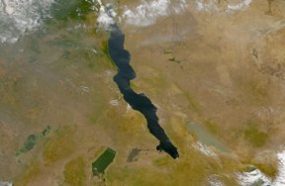Less mixing can affect lake’s ecosystem
Warming a large lake can cut microorganism populations and disturb its food chain.
By Emily Sohn
Lakes can be like bowls of soup in the microwave: They need a little stirring every now and then. Otherwise, all the heat ends up on top.
That’s exactly what’s happened in recent years to Africa’s Lake Tanganyika, scientists are reporting. Rising water temperatures have interfered with the lake’s normal mixing. As a result, the tiny organisms at the base of the food chain aren’t as abundant as they used to be.
 |
|
Lake Tanganyika in Africa, as seen from space.
|
| NASA/Goddard Space Flight Center |
Lake Tanganyika is the second-largest body of fresh water in the world, after Lake Baikal in Russia. The African lake is more than 1 kilometer deep in some places.
In such a large lake, nutrients tend to sink to the bottom. That’s bad news for the microorganisms called plankton, which live near the surface. Normally, these microscopic creatures rely on winds to churn the lake water and bring valuable nutrients back up.
But times have changed. Since 1913, the water temperature at the bottom of Lake Tanganyika has risen by about 0.2 Celsius degrees. Water near the surface has warmed by almost a full degree. Cold water is more dense than warm water, so the lake has grown more resistant to mixing.
With smaller amounts of nutrients coming up to the surface, the tiny creatures are suffering. Researchers found that populations of several species of plankton dropped 70 percent from 1975 to 2001.
 |
|
A view across Lake Tanganyika.
|
| (c) Science |
Scientists are worried because plankton are at the base of the food chain in lake ecosystems. So if plankton disappear, bigger creatures may run out of food and die out, too.
Waves of extinction, if they continue, could be far worse than burning your tongue on an unevenly heated bowl of chili.
Going Deeper:
Perkins, Sid. 2003. Slow turnover: Warming trend affects African ecosystem. Science News 163(June 28):404-405. Available at http://www.sciencenews.org/20030628/fob4.asp .







